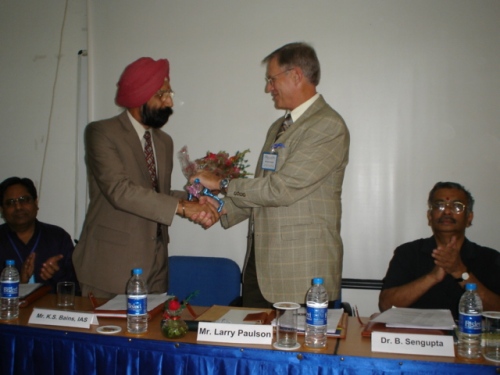27 Apr 2006-28 Apr 2006|Noida | Amity Campus, Sector-125, Noida
Two days National Seminar on “Role of Fly Ash in Organic Peri-Urban Agriculture and Environmental Protection” organized at Amity

There is a world wide awareness of and demand for organic food products. The current world market is of the order of 30 billion dollars and it is increasing at an annual rate of 15%. India’s share in this vast market is only a few crores of rupees. Keeping this in mind
Amity Institute of Organic Agriculture organized two days National Seminar on “Role of fly ash in organic peri-urban agriculture and environmental protection” which commenced from April 27, 2006 at Noida.
Welcoming the participants Mr. K.S. Bains, I.A.S. (Retd.), Padma Shri, Director General, Amity Institute of Organic Agriculture said, “Policy needs to be evolved regarding use of Fly Ash. Focusing on areas such as Pricing, distribution, packaging and popularizing fly Ash structure must be done.”
Dr. Vimal Kumar, Adviser, TIFAC, DST, Government of India in his keynote address said, “Fly Ash can be put to gainful use under organic farming by application of Fly Ash for wasteland development/reclamation of eroded soil/sodic-saline oil and cultivation of agriculture/floriculture/forestry on abandoned ash pond. Use of Fly Ash in agriculture and wasteland development holds good potential for organic farming and to increase the yield by 15-20% form the same available land area inter-alia to make, societal, environmental and economical impact”.
Inaugurating the seminar
Mr. Larry Paulson, Head, Agriculture, USAID and Chief Guest of the occasion spoke on reasons involved in slow growth agriculture like lack of Institutional credit, too many controls on agri-processing industries and declining development of new technologies. Speaking on matching resources and opportunities in South Asia Bio Safety Program (DBT/IFPRI/AGBIOS) he said develop and implement biotechnology and bio-safety policies at the regulatory and technical level, training to build grassroots understanding and address bio-safety policy considerations within the broader context of agricultural, natural resource, macroeconomic and trade policies”.
Dr. B. Sengupta. Member Secretary, Central Pollution Control Board, Government of India and Guest of Honour of the occasion quoted, “Fly Ash management is a very important issue. India is generating 150 million tons of Fly Ash every year and by the next 5-10 years India will have 140-150 tons of Fly Ash in the country which is the area of major concern. He advised that the new thermal power projects should utilize Fly Ash within 9 years and identified the areas where Fly Ash could be used such as construction activities, cement making, brick making and in agriculture. He promised full support on behalf of Central Pollution Control Board, Government of India for all those researchers who would like to work on the areas of Fly Ash”.
Dr. B.P. Singh, Director, SERC, DST, Government of India and Guest of Honour of the occasion advised students to have innovative ideas which can be implemented with thorough research work.
Technical Session-I on the topic “Special Lectures on an Introduction of the Issues” was chaired by Dr. Alok Adholeya, Director & Dean, Teri Rapporteur: Dr. Raj Ganguly, USAID and Technical Session-II on the topic “Environment Protection” was chaired by Dr. C.N. Ghosh, CMRI, Dhanbad.